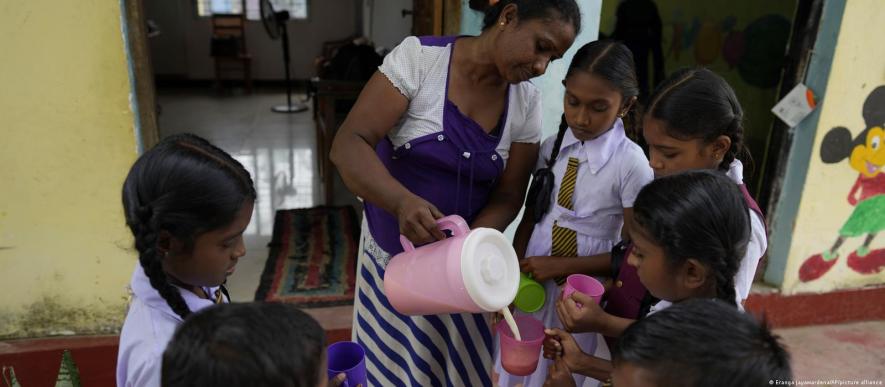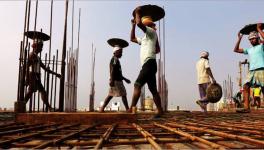How Hunger is Keeping Sri Lankan Children Away From School

During recent months, Nadeeka Priyadharshani, a garment factory worker living in Katunayake, close to Sri Lanka's major international airport, faced a new constraint when sending children to school — food.
As a result of the spiraling economic crisis, her family had to depend on a vegetable with rice for an entire day. However, there are some days there's nothing to cook, and no money to buy food, forcing Priyadarshani to keep the children home.
Priyadarshani is not alone in her predicament. As the unprecedented economic crisis in Sri Lanka wreaked havoc, disrupted livelihoods and saw businesses go bankrupt, many families started struggling for essentials such as food, medicine and fuel. Depleting foreign currency reserves made imported food items both expensive and scarce. A 2021 policy decision by the Sri Lankan government to rapidly ban organic agriculture resulted in a 40-50% harvest loss last year. By September, Sri Lanka's year on year food inflation hit 94.9%, and inflation was 69.8%, which dropped to 64.4% and 57.2% respectively, in December.
As the food supplies became strained, families falling into lower income groups like Priyadharshani's, dependent on a daily wage, became increasingly burdened, transferring some of this burden on to the children. A December situation report on Sri Lanka by the World Food Programme (WFP), states that 36% of the families are food insecure, while in June, UNICEF stated that 56,000 children have severe acute malnutrition.
'Too small to stay hungry'
This meant that many children began skipping school because they did not want to go to school with an empty stomach.
"When other children are having food [during the break] I cannot send [my children] to school to stay hungry," Priyadharshani, who is the sole breadwinner of her family, told DW.
On some days her 13 years old son goes to school without food, saying that he can tolerate the hunger, because he does not want to miss lessons. But, Priyadharshani feels that her six-year-old daughter is "too small" to stay hungry at school.
There are no recent statistics on how food insecurity is contributing to children skipping school, but a June report by the United Nations said that in schools where meals were not provided, the risk of children dropping out remained high.
In a comment to DW, a UNICEF spokesperson said that as per anecdotal evidence, school attendance in some areas of Sri Lanka has decreased to about 75 to 80% since the economic crisis in 2022, compared to previous years when attendance levels were between 80 to 85%.
Education experts are concerned about the links between food availability and school attendance. Dr. Tara de Mel, former Secretary to the Sri Lankan Ministry of Education, says trends of younger children attending schools only when there is a guaranteed meal, was "very evident," particularly in rural and under-privileged schools.
She is now part of a donor funded school feeding program, Rise Up, which operates in 51 schools around the country.
"Parents were encouraged, and indeed were relieved, that the school was giving a warm, nutritious meal on five days of the week," de Mel said.
Bleak future for children
Sri Lanka's public school teachers say that a number of factors linked to the economic crisis, from inability to afford food, and high transportation costs, to increased prices of stationery, are keeping children at home, adding that the patterns are especially prevalent among the families of tea plantation workers, and in the Colombo district.
"We do not see the government taking adequate measures to address the malnutrition among children in Sri Lanka. If this continues, the future of these children would be plunged to darkness," the General Secretary of the Ceylon Teachers' Union, Joseph Stalin, told DW.
He added that the existing government nutritional program targets only 1.1 million public school children out of 4.3 million.
The Sri Lankan Ministry of Education did not respond to DW's requests to discuss the matter.
For the eight-year-old-son of Kumuduni Nilusha Sanjeewani, a single parent living in Kerawalapitiya, Thudagahapitiya, some 10 kilometers (6.2 miles) from Colombo, the struggle is slightly different. He can go to school only on days one of his classmates brings an extra meal for him.
"On the days that [the classmate] does not come to school, I cannot send my son too, because there is no food," Sanjeewani said. Even then, a number of other factors, like the inability to buy stationary, and even afford a pair of shoes, can still keep him home, she says.
"His shoes are already worn out beyond repair by now," Sanjeewani added.
Students 'regularly' faint
A teacher from the Gampaha District in the Western Province, who wished to remain anonymous since he is not allowed to speak to the media, said that many of the school's students come from under-privileged families, and many come without breakfast or lunch on most days, and that students faint "regularly."
"Some of the advanced level students have not come to school for months, because they are doing labor jobs to support their families," he said.
Since there is no alternative to conventional classroom learning in Sri Lanka, missing school has a massive impact on all children, especially in the case of primary students aged five to 10 years, Dr. de Mel said.
"This will have short and long term impacts on learning and cognitive development, and [there may be] social interaction deficiencies in these children," she noted.
Some schools request parents not to send children without giving any food, Priyadarshani says.
"But what can we do if there is no food?" she asks.
Edited by John Silk
Get the latest reports & analysis with people's perspective on Protests, movements & deep analytical videos, discussions of the current affairs in your Telegram app. Subscribe to NewsClick's Telegram channel & get Real-Time updates on stories, as they get published on our website.
























